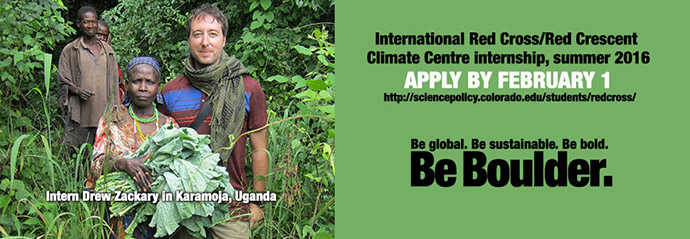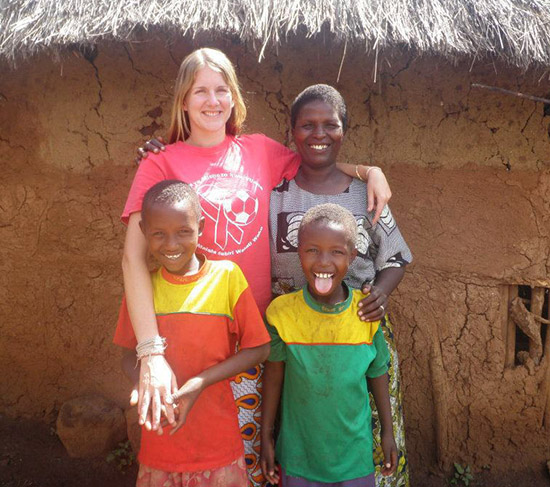CENTER NEWS |
|
Red Cross/Red Crescent Climate Centre Internship |
|
 |
|
***Application Deadline: Monday February 1, 2016*** |
|
CU-Boulder has partnered with the Red Cross Red Crescent Climate Centre (RCRCCC) to place graduate students in locations in eastern and southern Africa each summer. This collaborative program targets improvements in environmental communication and adaptation decision-making as well as disaster prevention and preparedness in the humanitarian sector. It connects humanitarian practitioners from the Red Cross/Red Crescent Climate Centre – an affiliate of the International Federation of Red Cross and Red Crescent Societies – with graduate student researchers at the University of Colorado who are interested in science-policy issues. Through this program we strive to accomplish three key objectives:
This internship program will place 1-2 Ph.D. and/or Master’s degree students in an IFRC regional field office, a National Society branch office, or with a partner organization for approximately 3 months. Students will design their own program of work in conjunction with CU-Boulder Director Max Boykoff and RCRCCC supervisors. The RCRCCC supervisors will liaise with specific IFRC field offices to identify potential projects and placements. Projects can encompass, but are not limited to, topics such as the use of scientific information in decision making, communication of probability and uncertainty, perceptions of risk, and characterizing vulnerability and adaptive capacity. Placements in the field will address specific needs identified by IFRC field staff related to challenges of science communication and adaptation decision-making. Participants will participate in an informal reading group designed to familiarize them with the Red Cross/Red Crescent organization and other topics of relevance to adequately prepare for field placements. The reading group will meet 2-3 times during the Spring 2016 semester. Participants will also be required to write six blog posts from the field during this placement, give some presentations (e.g. in ENVS, at CSTPR) upon return, and complete a report at the conclusion of their internship detailing their experience and research outcomes. $5,000 funding in total will be provided to offset expenses (in-country housing, food, airfare and in-country transportation). Expenses can vary widely depending on the location and nature of the placement. Interns will work with CU-affiliated travel agents to arrange round-trip airfare to their field site. Due to this $5,000 limit, applicants are encouraged to seek additional funds from alternate sources, as expenses can exceed this budgeted amount. This CU-Boulder program has now placed these five students in locations of eastern and southern Africa:
Projects have involved topics such as analysis of uses of regional climate forecasts to trigger anticipatory humanitarian action, and examinations of ways to improve the linking of science-based forecasts with humanitarian decisions. More information on the specifics of all these placements and activities can be found here. Application Details Successful candidates must be self-starters and capable of adapting to independent working conditions. Students must have the consent of their graduate advisor to participate. A detailed terms of reference tailored to each intern will be developed by the intern and the relevant contacts in the months leading up to placement in the field. Application Requirements (all submitted as separate pdf files):
Notification and Planning timeline:
Contacts Arielle Tozier de la Poterie (Graduate Student Co-coordinator) Meaghan Daly (Graduate Student Co-coordinator) These internships are made available through support by the Environmental Studies program (ENVS) and from the Cooperative Institute for Research in Environmental Sciences (CIRES) Center for Science and Technology Policy Research (CSTPR). |


